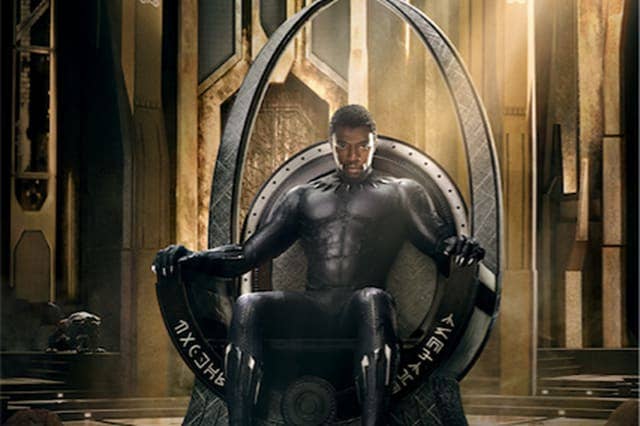Comic book OG Christopher Priest was reluctant about writing what turned out to be his greatest work. It was 1998 and Marvel, which had just filed for Chapter 11 bankruptcy, was desperate for a comeback when the company started the edgier Marvel Knights imprint. Priest—who holds the distinction of being the first full-time black writer at either DC or Marvel—was enlisted to write a new Black Panther series for the endeavor.
This obvious challenge was that Black Panther hadn’t been relevant in years, and the character itself had become a B-lister-at-best after debuting as a Fantastic Four adversary in 1966. Plus, there was the existential weight of being a black writer known for openly weaving race into his work. “I stopped being a writer, or being thought of as a writer,” Priest told Vulture in a recent interview, “and started being thought of as a ‘black writer.’” This wasn’t Priest distancing himself from his racial identity. There’s a version of inclusivity that states black voices are credible in specific lanes even if it’s under this wider umbrella of diversity. This ideology would lead someone to say, “Sure, Priest has been writing for decades, but he doesn’t quite have the experience to write about Superman, though.” It’s one of the many anxieties of being black in a white-dominated space.
Despite those initial roadblocks, Priest not only took on the job he excelled at it. Ultimately what made his Black Panther run (1998-2003) so reinvigorating was that it delivered a hero who wasn’t confined by any preconceived constructs. T’Challa’s a black polymath with his own set of ethics and king to a sovereign nation. This iteration of the character is crucial because the record-breaking blockbuster film, which is rooted in Priest's work, doesn’t exist without it. But the decades of appreciation for Priest’s work comes from how much depth it applied to Black Panther as a concept. T’Challa’s duties as the king of Wakanda and responsibilities in America form a tension that propels the 62-issue series, and it’s a thread that continues on in author Ta-Nehisi Coates’ more recent saga. The idea of a powerful African nation with its own complexities is a central audacity that ties into the allure of the Black Panther movie.

T’Challa doesn’t explicitly concern himself with race in Priest’s run, but the black-centric philosophy. In an effort to not just make a “black book,” Priest told Black Panther’s story through the lens of Everett K. Ross, a just-past-competent U.S. State Department officer assigned to escort Black Panther during his visit to America. Self-effacing and full of pop culture references, Ross becomes a stand-in for the audience, and his everyman nature forces us to see T’Challa with a sense of awe. When Black Panther conveniently escapes in a hidden ship during a pivotal chase scene in issue No. 11, for instance, Ross is right there to rein us in to contextualize: “[T’Challa’s] a full-bird monarch from one of the most technologically advanced nations on the planet. And, somehow, we keep forgetting that.”
The titular Black Panther is a bit too stoic to work as a narrator, but he does work as a character nonetheless because Priest outlines very concisely what T’Challa is about: He has an undying love of his people and dedication to his homeland. They’re a small set of traits that are malleable enough to jump from supernatural fantasy to political thriller. Black Panther’s triumph over satanic villain Mephisto in the series’ opening arc isn’t simply about good vs. evil as it is about connecting T’Challa to a mythos (the Panther God in this case), setting the tone of what’s to come. When it’s revealed that the only reason that Black Panther has been hanging with the Avengers is just to keep tabs on them, the shock is in how logical this reveal is. After all, why should an African king 100-percent trust a Westerner running around in tights and a star-and-stripes shield?
This iteration of the black panther is crucial because the record-breaking blockbuster film, which is rooted in Priest's work, doesn’t exist without it.
The subversive premise needles at entire concept of what it means to be a hero because Western civilization isn’t a priority for Black Panther. At one point, he sends the global economy into a tailspin to thwart his arch-nemesis Erik Killmonger’s plan to takeover Wakanda. The question of racial identity sneaks in directly in issue No. 6, where a crowd of black people form outside of a New York Hilton reception because of an invitation oversight (the organizers forgot to invite any black people). King T’Challa appears in front of the mass and proclaims that the Avengers are “their heroes” and that the Black Panther is “our hero.” He goes on to deny that title, saying, “In any country—among all peoples! We should not become polarized by self-interest—but embrace common humanity.” T’Challa hasn’t been rolling around spouting hotep-isms at the Avengers; his existence in America comes with tangential significance.
Not to sound all “their earlier stuff was better,” but the best storylines of Priest’s run are in issues 1-12, which cover Black Panther’s meeting with Mephisto and Enemy of the State—a transcontinental summertime blockbuster that finds Wakanda hi-jacked thanks to a farmer-turned-madman and some rogue U.S. Intelligence factions. Must-see showdowns like Black Panther's battle of attrition against Killmonger and damn-near causing World War III with Atlantis provided worthy follow-ups, but sales eventually declined midway through Bush’s first term. By issue No. 50, T’Challa was written out as the star of the series in favor of a new Black Panther: a New York officer that looked more like “Vin Diesel” than kingly.
“None of the artists could convey the BET/gangsta rap sensibility Marvel had requested; qualities Marvel insisted were missing from T’Challa,” Priest said about the misfire. “The thinking seemed to be, if we made Black Panther more ‘street,’ it would sell better.”
As absurd as the change-up was, Black Panther-for-the-streets wasn’t enough to sully what was a groundbreaking take on an underdeveloped character. There are plenty of mainstream black heroes, including John Stewart as the Green Lantern, Static, Falcon, and Luke Cage, to name a few. But Black Panther’s universe carries a specific sense of gravity because of how rigorous and thrillingly it explores the idea of an African superpower that was void of Western influence. Priest is solely responsible for making that premise real on the pages he commanded and now there’s the chance for a new generation to see that world come to life on the big screen.

